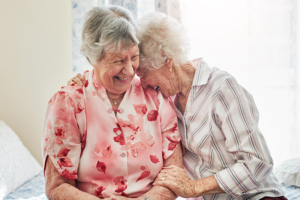New Study Shows You Already Have the Best Medicine for Dementia

When living with dementia, don’t overlook your daily dose of laughter.
Looking after a person you love with dementia is certainly nothing to laugh about. Yet scientific studies are frequently pointing to the benefits associated with humor, and incorporating it into dementia care may be precisely what the doctor ordered to boost total well-being for your aging parent.
For instance, an Australian study just recently announced that humor therapy can aid in eliminating agitation in people who have dementia as successfully as antipsychotic medications, without the unintended side effects. Shared laughter connects us, and assists those with cognitive difficulties to feel understood, safe, and at ease. According to Lori La Bey, founder of Alzheimer’s Speaks, “When anyone is sick or having a hard time, they still like to laugh. I spend a lot of time teaching people that feelings don’t go away, and it’s okay to get back to that zone.”
Laughter also produces endorphins, which inhibit stress hormones, and may also improve blood pressure levels and reduce pain for older adults – all of which make it well worth adding to your dementia care regimen, either by registering for a laughter yoga class along with your loved one (which incorporates clapping, singing, silly poses, and of course, laughter) or simply implementing ideas including these at home:
- Incorporate lightheartedness and silliness randomly throughout the day. Sing goofy songs, dance around the house, tell simple jokes, and develop an environment of happiness for the older adult.
- Realize that what is successful today will possibly not work tomorrow – and sometimes even an hour or so from now. Assess your loved one’s reactions, and if anything seems to increase anxiety, shelve the idea and attempt again later.
- Remove quarreling and correcting from conversations with the senior. A simple “yes” and redirection to a different topic or activity goes a long way in preempting negativity.
- Emphasize to yourself that it’s completely acceptable to be joyful. Laughter and dementia do not need to be mutually exclusive.
Allow Responsive Home Care, the top provider of Alzheimer’s care in Fort Lauderdale, FL and the surrounding area, to help enhance life for a senior loved one with dementia. Each of our specialized dementia caregivers is fully trained and knowledgeable in a wide variety of creative, effective care techniques. Older adults achieve the added benefit of improved socialization, combined with crucial respite from care duties for family members, making a partnership with a Responsive Home Care caregiver a win-win!
Call us at (954) 486-6440 to arrange an in-home assessment to find out more about our Alzheimer’s care in Fort Lauderdale, FL and nearby areas, and to ask about some additional helpful resources to further equip you to provide the most effective care for your family member.

